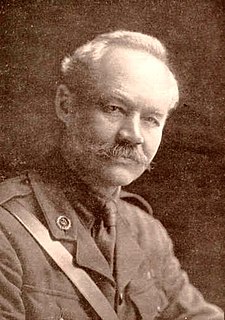A Quote by Dalai Lama
The most important thing is practice in daily life; then you can
know gradually the true value of religion. Doctrine is not meant for
mere knowledge, but for the improvement of our minds. In order to do
that, it must be part of our life. If you put religious doctrine in
a building and when you leave the building depart from the practices,
you cannot gain its value.
Related Quotes
This new enemy seeks to destroy our freedom and impose its views. We value life; the terrorists ruthlessly destroy it. We value education; the terrorists do not believe women should be educated or should have health care, or should leave their homes. We value the right to speak our minds; for the terrorists, free expression can be grounds for execution. We respect people of all faiths and welcome the free practice of religion; our enemy wants to dictate how to think and how to worship even to their fellow Muslims.
Our practices - our most spiritual practices - are hanging laundry on the line, raising children, building strong relationships, practicing kindness as much as we can, striving for excellence in the workplace, and developing deeper self-knowledge. I wrote The Four Purposes of Life to assist in these endeavors.
A comprehensive doctrine, either religious or secular, aspires to cover all of life. I mean, if it's a religious doctrine, it talks about our relation to God and the universe; it has an ordering of all the virtues, not only political virtues but moral virtues as well, including the virtues of private life, and the rest. Now we may feel philosophically that it doesn't really cover everything, but it aims to cover everything, and a secular doctrine does also.
We can reject everything else: religion, ideology, all received wisdom. But we cannot escape the necessity of love and compassion. This, then, is my true religion, my simple faith. In this sense, there is no need for temple or church, for mosque or synagogue, no need for complicated philosophy, doctrine, or dogma. Our own heart, our own mind, is the temple. The doctrine is compassion. Love for others and respect for their rights and dignity, no matter who or what they are: ultimately these are all we need.
The philosopher believes that the value of his philosophy lies in the whole, in the building: posterity discovers it in the bricks with which he built and which are then often used again for better building: in the fact, that is to say, that building can be destroyed and nonetheless possess value as material.
There is a direct line that runs from our doctrine to our actions, from what is in our minds to what is in our words and ways... The heart spills over into life. Thoughts of God, and of all else, erupt into acts. The filling of the heart with wise thoughts of God becomes the most important, the most practical, business in the world.
we are such inward secret creatures, that inwardness the most amazing thing about us, even more amazing than our reason. but we cannot just walk into the cavern and look around. most of what we think we know about our minds is pseudo-knowledge. we are all such shocking poseurs, so good at inflating the importance of what we think we value.
Everyone talks about religious liberty, but no one believes it. So let us be blunt about it: we must use the doctrine of religious liberty to gain independence for Christian schools until we train up a generation of people who know that there is no religious neutrality, no neutral law, no neutral education, and no neutral civil government. Then they will get busy in constructing a Bible-based social, political, and religious order which finally denies the religious liberty of the enemies of God.
A doctrine-teaching, character-building university, the Brigham Young University is dedicated to the building of character and faith, for character is higher than intellect . . . . We are men of God first, men of letters second, men of science third, and noted men fourth, men of rectitude rather than academic competence. . . . Our academic training must be as impeccable as our lives.
... believing in a God whom we cannot but regard as evil, and then, in mere terrified flattery calling Him 'good' and worshipping him is a still greater danger... The ultimate question is whether the doctrine of the goodness of God or that of the inerrancy of scripture is to prevail when they conflict. I think the doctrine of the goodness of God is the more certain of the two. Indeed, only that doctrine renders this worship of Him obligatory or even permissable.
The scientific value of truth is not, however, ultimate or absolute. It rests partly on practical, partly on aesthetic interests. As our ideas are gradually brought into conformity with the facts by the painful process of selection,-for intuition runs equally into truth and into error, and can settle nothing if not controlled by experience,-we gain vastly in our command over our environment. This is the fundamental value of natural science
No one can write their real religious life with pen or pencil. It is written only in actions, and its seal is our character, not our orthodoxy. Whether we, our neighbor, or God is the judge, absolutely the only value of our religious life to ourselves or to anyone is what it fits us for and enables us to do.








































